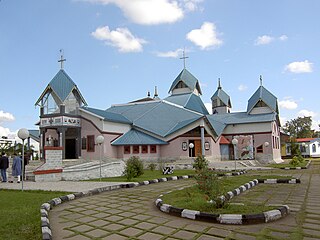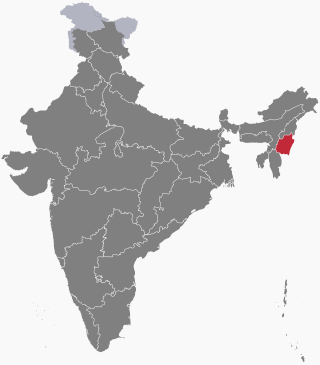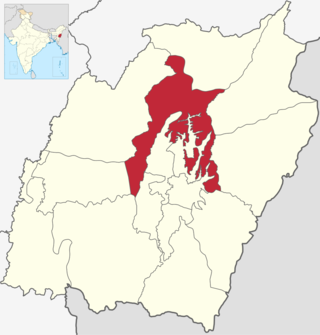
Nagaland is a state in the north-eastern region of India. It is bordered by the Indian states of Arunachal Pradesh to the north, Assam to the west, Manipur to the south, and the Naga Self-Administered Zone of the Sagaing Region of Myanmar (Burma) to the east. Its capital city is Kohima and its largest city is the twin Chümoukedima–Dimapur. The state has an area of 16,579 square kilometres (6,401 sq mi) with a population of 1,980,602 as per the 2011 Census of India, making it one of the least populated states in India.

Manipur is a landlocked state in northeast India with Imphal as its capital. It borders Assam to the west, Mizoram to the south, and Nagaland to the north. It shares international borders with Myanmar, specifically the Sagaing Region to the east and Chin State to the southeast. Covering an area of 8,621 square miles, the state consists mostly of hilly terrain with the 700-square-mile Imphal Valley inhabited by the Meitei (Manipuri) community, historically a kingdom. Surrounding hills are home to Naga and Kuki-Zo communities, who speak Tibeto-Burman languages. The official language and lingua franca, Meitei (Manipuri), also belongs to the Tibeto-Burman family.

The Insurgency in Northeast India involves multiple separatist and jihadist militant groups operating in some of India's northeastern states, which are connected to the rest of India by the Siliguri Corridor, a strip of land as narrow as 14.29 miles (23.00 km) wide.

Okram Ibobi Singh is an Indian Politician who is currently serving as a member of the Manipur Legislative Assembly representing Thoubal Assembly constituency since 2007, from Khangabok Assembly constituency from 2002 to 2007 and from 1984 to 1995. He also served as the 11th Chief Minister of Manipur from 2002 to 2017 and the Leader of the Opposition, Manipur Legislative Assembly from 2017 to 2022 as a member of the Indian National Congress.

Senapati district, is one of the 16 districts of the Indian state of Manipur. The present Senapati district was formed in December 2016, after spawning off the Sadar Hills region in the south into a separate Kangpokpi district. The district headquarter is located in the town of Senapati, also known as Tahamzam.

Nongthombam Biren Singh is an Indian politician, former footballer and journalist who is currently serving as the 12th Chief Minister of Manipur since 2017, in addition to representing the Heingang Assembly constituency in the Manipur Legislative Assembly since 2002. He is a member of the Bharatiya Janata Party. Besides being the chairman of Shri Shri Govindaji Temple Board, he is the first incumbent Chief Minister who serves as the president of the Lainingthou Sanamahi Temple Board (LSTB), the temple development board of Lainingthou Sanamahi of the Sanamahi religion since 2021.

Christianity is the second largest religion in Manipur, a state in Northeast India, according to 2011 census. The tribal communities, Kukis and Nagas are overwhelmingly Christian, along with their kindred communities in the neighbouring states. The dominant Meitei community has only small numbers of Christians, but Meitei groups claim Christianity to be a threat. At the start of the 2023–2024 Manipur violence, Meitei mobs burned down 200–300 churches in the Imphal Valley belonging to all communities, and prohibited pastors from rebuilding them.

The Manipur Legislative Assembly is the unicameral legislature of the Indian state of Manipur.
Yaingangpokpi (YKPI) is a village in the Imphal East District of Manipur, India. It is 24 km from Imphal at the northeastern corner of Imphal Valley. It is regarded as the centre of a "bowl", surrounded by hills on all sides except for the few valleys that pass through the village. The major ethnic groups within the village are Meitei, Tangkhul. The Tangkhuls live in the adjoining village of New Canaan.

The Insurgency in Manipur is an ongoing armed conflict between India and a number of separatist rebel groups, taking place in the state of Manipur. The Insurgency in Manipur is part of the wider Insurgency in Northeast India; it displays elements of a national liberation war as well as an ethnic conflict.

A Legislative Assembly election was held in Manipur on 4 March and 8 March 2017 to elect the 60 members of the Manipur Legislative Assembly. before the expiration of the term of the previous Assembly on 18 March 2017. The election was fought mainly on the issues of "territorial integrity of Manipur" and the Naga peace accord. The incumbent Indian National Congress lost majority, though it had plurality. The Bharatiya Janata Party, which won 21 seats, formed the government with the support of allies.

Kangpokpi district is one of the 16 districts in the Indian state of Manipur. It was created in December 2016 from areas in the Sadar Hills region which were previously part of Senapati District.

Tengnoupal district :/teŋ-nə́u-pəl/) is a district in Manipur, India. It is a district which was created in December 2016 by splitting the Chandel district.
On 3 May 2023, ethnic violence erupted in India's north-eastern state of Manipur between the Meitei people, a majority that lives in the Imphal Valley, and the Kuki-Zo tribal community from the surrounding hills. According to government figures, as of 3 May 2024, 221 people have been killed in the violence and 60,000 people have been displaced. Earlier figures also mentioned over 1,000 injured, and 32 missing. 4,786 houses were burnt and 386 religious structures were vandalised, including temples and churches. Unofficial figures are higher.

Arambai Tenggol is a Meitei activist organisation in the Indian state of Manipur founded by Manipur's titular ling and Rajya Sabha member Leishemba Sanajaoba, who also remains as its chairman. Arambai Tenggol has been described as a radical organisation, or as a radicalised armed militia. It is also a revivalist organisation that aims to reestablish the pre-Hindu, native Sanamahi religion among the Meiteis. It enjoys the patronage of Sanajaoba as well as the chief minister N. Biren Singh. During the 2023–2024 Manipur violence, members of the Kuki-Zo community blamed it for having carried out deadly attacks against them. In January 2024, the organisation demonstrated its influence by summoning all the elected Meitei legislators of the state for a meeting to deliberate on the defence of Meiteis in the prevailing conflict.

The 2024 Indian general election was held in Manipur on 19 April and 26 April to elect two members of the 18th Lok Sabha, from the constituencies of Inner Manipur and Outer Manipur. The election got scheduled in the midst of year-long ethnic violence between the valley-based Meitei community and the hill-based Kuki-Zo community. There were reports of violence and intimidation by armed militias during the campaigning as well as polling but, on the whole, the election got conducted peacefully. Opposition Indian National Congress candidates, Bimol Akoijam and Alfred Kanngam Arthur, won the two seats respectively.
The Coordinating Committee on Manipur Integrity (COCOMI) is a joint body of Meitei civil society organisations in the Indian state of Manipur. It came into being in 2019 in the wake of the peace talks between the Indian government and Naga rebel groups, as the latter sought autonomy and integration of the Naga-inhabited areas of Manipur into a Greater Nagaland. COCOMI campaigns for maintaining the "territorial integrity" of Manipur, which was a princely state under the British Raj and became part of the Indian Union upon India's independence.
The Federation of Haomee is a Meitei-led civil society organisation based in the Imphal Valley of Manipur, India. In addition to Meiteis, it has participation from some Naga groups. The organisation claims to campaign for the rights of the "indigenous communities" of Manipur, including the Meitei and Naga people among them, but excluding the Kuki people. It has published a book titled Manipur after the Coming of Kukis authored by one of its functionaries R. K. Rajendra Singh, arguing that Kukis "arrived" in Manipur a century ago and transformed Manipur in some way. Scholars have called it a "vigilante organisation" that has generated a "free flow" of hate speech against the Kukis of Manipur.
The International Meeteis Forum is a Meitei ethnic advocacy group in the Indian state of Manipur. Its objectives are to assert Meitei indigeneity in Manipur, to unify Meiteis around the world, to campaign for the territorial integrity of the Manipur state and to block the influx of alleged foreigners. Founded in 2012 by a retired army officer R. K. Rajendro, it later teamed up with the Federation of Haomee with similar ideological motivations. Both the organisations generated free-flowing hate speech against the Kuki community of Manipur, labelling them as "immigrants" or "foreigners", which was instrumental in the generation of 2023 Manipur violence.

The Meitei people, also called Manipuri people, are one of the minority ethnic groups in Nagaland state. They were living in the region before the formation of the Indian state of "Nagaland".













